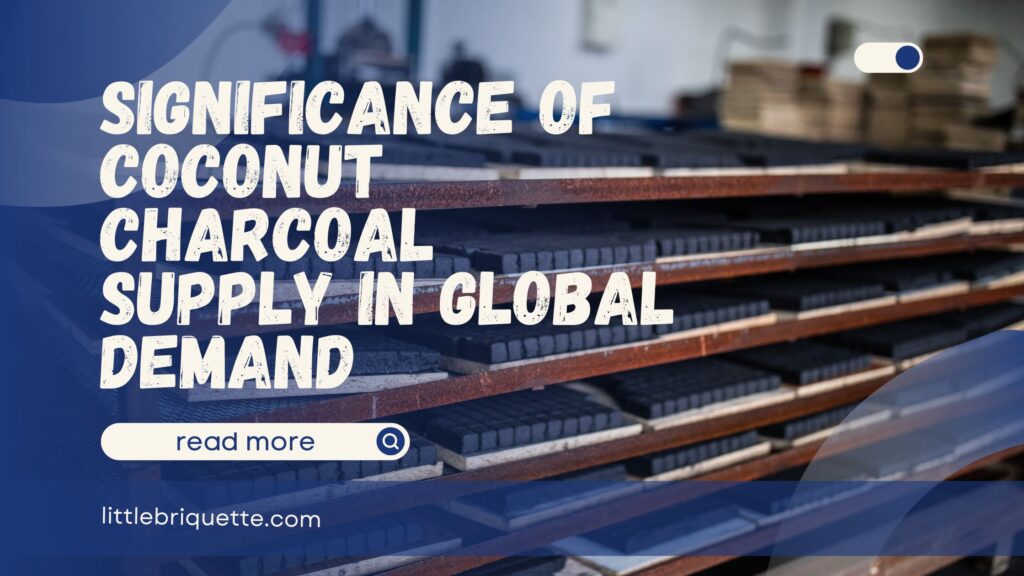Charcoal made from coconut shells has now penetrated global markets. Coconut charcoal boasts numerous advantages, suitable for cooking, hookah smoking, and even in pharmaceutical and beauty industries. Consequently, demand for coconut charcoal supply is on the rise due to its versatile applications.
Coconut charcoal is produced by controlled burning of coconut shells to yield active carbon. This process results in charcoal with large pore structure, making it highly suitable for various applications, including fuel and adsorbent in industrial processes.
Significance of Coconut Charcoal Supply in Global Demand
The supply of coconut charcoal holds significant importance in meeting current global market needs for several reasons:
Environmental-Friendly Alternative

An environmentally-friendly alternative refers to solutions and technologies that manage natural resources better and reduce negative environmental impacts. In the context of energy, this includes the use of renewable resources such as solar, wind, and hydro power, as well as alternative fuels like coconut charcoal and biodiesel, which have lower carbon footprints compared to conventional fossil fuels.
These alternatives not only help reduce greenhouse gas emissions but also decrease reliance on limited resources and mitigate harmful air pollution, benefiting human health. By implementing these technologies, we can move towards a more sustainable society and maintain global ecosystem balance for future generations.
Wide-ranging Uses of Coconut Charcoal

Coconut charcoal finds extensive use across various industries and applications. Traditionally, it is used as an eco-friendly alternative fuel for heating and cooking in households and large-scale industries. Additionally, coconut charcoal is a primary raw material in producing activated charcoal used in pharmaceuticals for treatments and in the food industry as an adsorbent for filtering and purification. The cosmetic industry also utilizes coconut charcoal as a base ingredient for skincare products claiming detoxification and deep cleansing benefits. Thus, coconut charcoal demonstrates flexibility and relevance across various economic sectors, maintaining its popularity as a multifunctional and effective sustainable solution in various industrial applications.
Global Demand Increase

The global demand for coconut charcoal is driven by several key factors. Firstly, increasing awareness of energy sustainability and the need to reduce carbon footprints has boosted the use of coconut charcoal as a more environmentally-friendly alternative to fossil fuels. Furthermore, rapid global population growth and urbanization strengthen the demand for reliable and affordable energy solutions.
Moreover, the application of coconut charcoal in the food and pharmaceutical industries has also seen significant growth due to its effectiveness as an adsorbent. Thus, coconut charcoal not only meets global energy needs but also provides solutions to various environmental and industrial challenges today.
Global Demand for Coconut Shell Charcoal
The demand for coconut shell charcoal has seen significant growth in various major global markets, including Asia, Europe, and North America. In Asia, especially in countries like Indonesia, the Philippines, and Vietnam, coconut charcoal is widely used as domestic fuel for cooking and heating. This demand is driven by rapid population growth and high urbanization, increasing the need for cleaner and more affordable energy sources. Additionally, coconut charcoal is used in the food and pharmaceutical industries in Asia as an adsorbent for food processing and medicine, further increasing demand in these sectors.
In Europe, demand for coconut charcoal is driven by strict environmental policies and increasing consumer preferences for eco-friendly products. Coconut charcoal is considered a more sustainable alternative compared to mineral coal or other fossil fuels due to its lower carbon footprint and easier renewability, making it increasingly favored by industries committed to environmentally-friendly production practices.
In North America, coconut charcoal has also garnered increased attention, particularly in markets like the United States and Canada. Consumers there are increasingly choosing more natural and organic products, including coconut charcoal used in cosmetics and skincare products. Additionally, the use of coconut charcoal as an adsorbent in the pharmaceutical and water treatment industries has also boosted demand in this region.
Factors driving the global demand increase for coconut charcoal include energy sustainability, population growth, rapid urbanization, changes in global environmental regulations, and increased consumer awareness of environmentally-friendly products. Thus, coconut charcoal not only meets the growing energy needs in the global market but also provides sustainable and diverse solutions across various industrial and consumer sectors.
Marketing and Distribution Strategies
To enhance sales of coconut charcoal in the global market, strategic approaches and effective distribution models are essential. These are implemented to help maintain a healthy environment and increase public awareness.
By employing focused marketing strategies and efficient distribution models, coconut charcoal companies can leverage the vast potential of the global market and enhance their global presence in a sustainable and profitable manner.
Strategic Approach to Coconut Charcoal Supply
Marketing coconut charcoal to the global market requires a strategic approach to address challenges and capitalize on existing opportunities. One effective approach is building a strong brand image based on sustainability and product quality. Clear communication about the benefits of coconut charcoal as an eco-friendly fuel or as a raw material for specific industrial applications is key to attracting global market attention. Through digital marketing campaigns and social media, companies can effectively reach a global audience, build brand awareness, and educate potential consumers about the advantages of coconut charcoal compared to other alternatives.
Effective Distribution Models
In terms of distribution, it is important to have a flexible and efficient model to meet demand from various international markets. Collaborating with local distributors or agents who have in-depth knowledge of the local market can help accelerate market penetration and overcome logistical barriers. Suitable distribution options may include distributor and retailer networks, global e-commerce, or strategic partnerships with local companies to directly market coconut charcoal products to industries or end consumers. By adapting distribution models to meet regional market needs and characteristics, companies can increase product accessibility and maximize their global market penetration.
Best Coconut Charcoal Supply in the World
It should be noted that high-quality coconut charcoal is sought after in the global market. Indeed, the quality of coconut charcoal can also affect superior food results or more. One of the best coconut charcoal supplies in the world is Little Briquette. Little Briquette offers the best quality using raw materials from its own Sumatra farm. Contact this number for the best quality charcoal and affordable prices.

